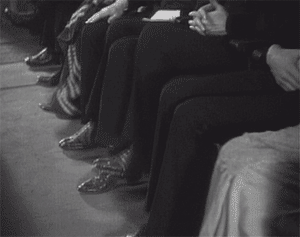Creative Fidgeting

An article by Roland Rotz, Ph.D., in ADDitude Magazine this month claims you shouldn’t fight the fidget, especially when it comes to children with ADHD:
Doing two things at once, it turns out, can actually help focus the ADHD brain on a primary task.
Experts believe that engaging in an activity that uses a sense other than what’s required for your primary task — listening to music while reading a social studies textbook, for example — can enhance focus and improve performance in children with attention deficit disorder. These secondary tasks are called fidgets — mindless activities you can do while working on a primary task.
Rotz recommends walking, moving around, doodling, using multicolored pens and pencils, keeping your hands busy, listening to music, and chewing gum.
I think anyone–with or without ADHD–can benefit from a bit of creative fidgeting. When I’m stuck in a novel I’m writing, it always helps to get up and move around. When we lived in the Outer Richmond in San Francisco, I used to take long walks on Ocean Beach (well, yes, that does sound like a personal ad, but I did!), and I never came home from one of those walks without a few paragraphs in my head. Something about the zen aspect of moving with no invited noise–I never wear headphones when I walk, so the noise was that of the waves and water, and the hum of traffic on the Great Highway–intensified my focus, such that I would write in my mind as I walked, repeating the sentences in order to memorize them.
I say “invited noise” because, while noise is inescapable, we don’t have to invite it in. Turning off the headphones when you’re running or walking, or turning off the TV when you’re on the treadmill, or turning off the radio in the car, is a way of keeping the endless, not-so-ambiant noise at bay. Of course, one of the fidgeting activities recommended in the ATTitude article is listening to music–so it really depends on the person. My husband always listens to music when he’s writing or reading, and it works for him, but anything with words completely stumps me, because the words crowd out the ones I’m trying to write down. That’s why I can’t write in cafes, which is a method some of my writer friends swear by.
Think about your own creative process. Are there any kinds of fidgeting you do that bring you focus?

 In July’s obit section, WORD magazine remembers John Carter, songwriter, producer, and A&R man extraordinaire, who “was instrumental in the careers of and a passionate supporter of Bob Seger, The Motels, Sammy Hagar, Melissa Etheridge, Tori Amos, David and David, and … Tina Turner.”
In July’s obit section, WORD magazine remembers John Carter, songwriter, producer, and A&R man extraordinaire, who “was instrumental in the careers of and a passionate supporter of Bob Seger, The Motels, Sammy Hagar, Melissa Etheridge, Tori Amos, David and David, and … Tina Turner.”